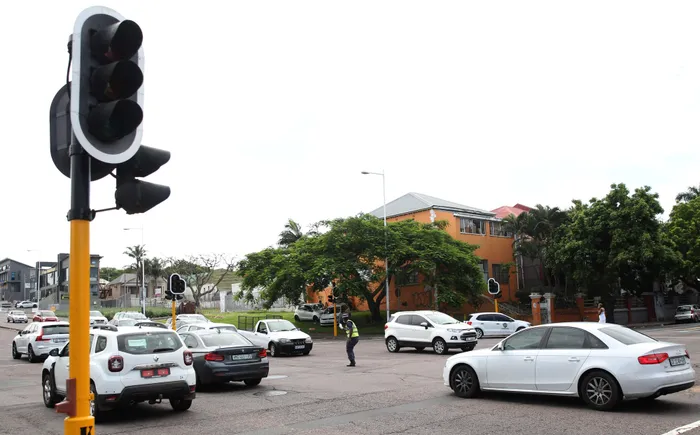REK JOU CHEQUE: Take a load off load shedding

Metro police officers controlling the traffic at the traffic lights during load shedding. Picture: Doctor Ngcobo/African News Agency(ANA)
On Thursday, 8 February 2024, in his State of the Nation address, President Cyril Ramaphosa announced that the government was “confident that the worst is behind us and the end of load shedding is finally within reach”.
As a South African, I was thrilled to hear this, as I am really fed up with load shedding and its effects on businesses and households. Sadly, my joy didn’t last very long.
Just hours after our President made this speech, we were thrust into Stage 429 of load shedding!
Am I the only one who feels like we are in the Twilight Zone or in some C-grade movie?
However, to maintain my sanity, I have decided not to dwell too much on how badly load shedding affects our lives (on personal and business levels) and rather focus on what we can do to help us get through this.

Tips from my load shedding survival kit:
– Don’t get yourself all worked up, stressed and angry about load shedding. Those in charge earn megabucks, have lots of savings and investments, and probably don’t bat an eyelid at our anger and frustration. As ordinary, struggling citizens, we don’t have the luxury of getting physically or mentally ill and missing work (and pay).
– Do what you must to preserve your phone’s battery life. Delete apps you don’t use. Ensure that your power banks are charged, and only used during load shedding.
– Make sure you have candles and that the batteries and bulbs in torches and lamps are working.
– Try and always have some cash on hand, in case you need to make a purchase and the ATMs and card machines are offline.
– Invest in a gas tank and gas stove. These days, cooking on gas is much more cost-effective even when the power is on.
– Dish out food into smaller pots, so that they are easier and quicker to warm on the gas stove.
– Boil water beforehand and keep them in flasks.
– Fill some bottles and containers with water and freeze them. When the power goes out, they will act as ice-bricks to keep the food in your freezer from defrosting and going off.
– The same goes for some types of medications that need refrigeration.
– If you have a baby, sterilise their bottles before lights out.
– Invest in thermal covers like Wonderbags to keep food warm in pots and dishes.
– Hang your clothes carefully on the washing line to minimise creasing. There is nothing worse than staring at creased clothes you want to wear and not being able to iron them.
– If you have them, put off your automatic garage door mechanisms and security gates, so that you can manually open and close the doors. I forgot to do this once and couldn’t get out of the garage, and ended up having to use Uber, because the car was stuck in the garage.
– Make sure that at least one person in the house has enough data so that the others can hotspot off them.
– Children get a lot of homework and need to study – make sure to print what they need ahead of load shedding.
– Regularly save your work on your computer. Losing work when the power goes out in the the middle of a project can be a disaster.
– Just before load shedding hits, switch off your plugs to appliances. Flip the switch at the wall, and then wait until the power is fully restored before you turn the power to appliances back on. Load shedding can damage appliances, which cost a small fortune to replace or even repair.

Dangerous
– If you have to walk home from taking public transport and it is already dark, and the streetlights are off, it can make things even more dangerous. Make plans for someone to collect you or walk you home.
– Make sure that you alert your ward councillor to unsafe conditions caused by non-working street lights in your area. It’s an election year. You might actually get something done.
– Homes are vulnerable to break-ins because alarm systems are often disrupted by load shedding. Use a battery-powered unit. This ensures that your alarm and armed response units are still activated during power outages.
– Check with your insurance to find out which of your items are covered in case of damage during load shedding, so that there is no dispute afterwards.
– Know your load shedding schedule, and inform your family of it so that everyone can make the required adjustments and arrangements. However, I have to mention that there isn’t even stability in the schedule. One minute, we are in Stage 2 – the next minute, we are right back in the Twilight Zone at Stage 6, or 8 or 429!
– Cut down on luxuries, save some money and invest in an inverter system, solar panels or a generator.
– Shop around for prices for alternative energy sources. There are some options which actually see you saving money on power while making you less dependent on Eskom.
– Add more gas and data costs to your monthly household budget.
Please do not think that I am suggesting that we just accept load shedding. Hell no!
We need to hold our leaders (at all levels) accountable. However, it doesn’t hurt to put things in place that will make our lives easier while we deal with this.
Hit me up on Facebook at Moeshfieka Botha.